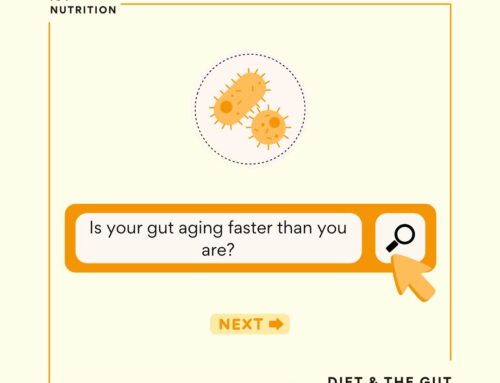If you’re struggling with poor digestion, feeling lethargic or bloated, having trouble focusing, and can’t seem to lose weight no matter what you do – it could be because of an imbalance of “good” and “bad” bacteria in your gut.
This problem is surprisingly common. But don’t worry – there are simple ways to get rid of harmful gut bugs while keeping your helpful ones alive so that you can start to feel better.
In this blog post, we’ll be discussing how to balance out the good & bad microbes living in your gut microbiome. So keep reading if you want to learn more about improving your overall well-being with easy strategies for gut healing!
Quick Recap: What is Dysbiosis?
You might already know a bit of microbiome science, but here’s a quick recap.
The microbiome is an ecosystem of millions of microbes – like bacteria, yeasts, and even fungi – living within or on the human body. The term “gut microbiome” refers to the microbes inhabiting the GI tract.
At first glance, microbes living in the body might sound pretty gross – but it turns out they’re critical to our health. Many microorganisms living within us benefit our bodies by regulating our metabolism, helping us absorb vitamins from food, supporting our immune system, and much more.
The thing is, not all of the microorganisms in our microbiomes are helpful. Some are harmful. These harmful microbes can damage the gut barrier, increase inflammation, and wreak havoc on our metabolisms, hormone production, immune systems, and mental health.
Plus, they can cause uncomfortable digestive issues like gas, bloating, and stool irregularity – no fun.
To minimize the gut damage and annoying symptoms the harmful microbes cause and maximize the benefits helpful microbes confer, we want many beneficial microbes and very few harmful microbes to live in our guts.
There are typically too many harmful microbes and not enough helpful microbes in an unhealthy microbiome. This state of imbalance is called dysbiosis.
Many scientists argue that dysbiosis, an imbalanced gut microbiome, is likely the culprit of most digestive health issues in America.
Check out our blog titled “Is My Microbiome Imbalanced” to find out whether you might have dysbiosis.
Overcoming Dysbiosis
To overcome dysbiosis, you’ll want to:
- Eliminate the harmful pathogens living in your gut microbiome
- Keep the helpful microbes already living in your gut microbiome
- Increase populations of helpful microbes living in your gut microbiome
You might already be familiar with strategies for keeping and increasing populations of helpful microbes in your gut microbiome, like:
- Consuming probiotics
- Eating fiber
- Eating fermented food
- Exercising
- Avoiding hefty doses of antibiotics
We’ve heard that all before. But what about the first piece of the equation? How do we eliminate harmful pathogens living in our gut microbiome?
Getting Rid of the Bad Guys: Antibiotics?
Traditional treatment for dysbiosis typically involves antibiotics to clear the “bad” bacteria. The goal is to get rid of the harmful bacteria that cause symptoms.
Antibiotics are the first-line treatment for dysbiosis, but they are often ineffective. Studies have shown that antibiotics only work in about 50% of SIBO-related dysbiosis cases (Source).
That may be because antibiotics kill both good and bad bacteria, leading to an imbalance in gut flora. As a result, other treatment options, such as probiotics or herbals, may be more effective in treating dysbiosis.
Getting Rid of the Bad Guys: Herbal Therapies?
Probiotics and other natural therapies, such as herbs, may be as or more effective in restoring the balance of gut bacteria and treating dysbiosis, but there are a few caveats (1).
They may be less risky, but some studies show they are less effective than antibiotics. They are also prohibitively expensive for many patients. More research is needed to evaluate their level of efficacy.
Many scientists argue that one of the main reasons dysbiosis is so challenging to treat is that a variety of different bacteria can cause it. Perhaps herbal treatments work well for one strain but not another.
It seems that there aren’t many great options – or are there?
Getting Rid of the Bad Guys: IgY Antibodies?
IgY antibodies have been proven to neutralize and remove several pathogens from consumers’ guts.
Scientists at IgY Nutrition realized that IgY antibodies could address dysbiosis by neutralizing well-known bad actors in gut microbiomes. So, they created IgY Max.
IgY Max is a specifically immunized egg-based supplement containing antigen-specific antibodies that target and neutralize 29 dysbiotic pathogens commonly found in the human gut microbiome, including Klebsiella pneumoniae, Salmonella, various strains of Staphylococcus and Streptococcus, and other strains associated with SIBO.
In non-science speak: IgY Max is a supplement (made of only egg yolk) containing antibodies that neutralize pathogens living in the gut. These pathogens could contribute to your digestive symptoms if you have them.
Upon consumption, IgY Max antibodies exert their anti-pathogenic activity throughout the entire length of the gastrointestinal tract. They have a high pathogen-antibody affinity, inhibiting bacterial adhesion, suppressing colonization, and neutralizing each targeted pathogen thoroughly. Neutralized pathogens are expelled from the gut through the stool (your poop!).
The product’s elimination of pathogens allows beneficial microbes to flourish, which may help to restore microbial diversity to the microbiome and rebalance it. This positive shift in microbiome composition reduces dysbiotic pathogens’ initiation of gastrointestinal damage and amplifies healthy flora’s conferral of gastrointestinal benefits.
University-led studies of IgY Max confirm this, showing that IgY Max consumers’ beneficial flora, gut barrier integrity, and inflammation levels improved significantly over eight weeks of use.
Participants’ levels of inflammatory cytokines, high-sensitivity C-reactive protein, helpful bacteria counts in the stool, zonulin, histamine, and diamine oxidase improved substantially. Perhaps most importantly, participants’ symptoms improved upon use.
Consumers report decreased symptoms of dysbiosis following consistent consumption, including improved stool regularity and composition, reduced bloating and gas, and higher energy levels. Though unofficial, the abundance of positive Amazon reviews describing users’ alleviation of symptoms is a telling indicator of IgY Max®’s power to benefit consumers.
Have you tried IgY Max for your digestive symptoms? Let us know in the comments on Instagram @igynutrition. See you next time!




